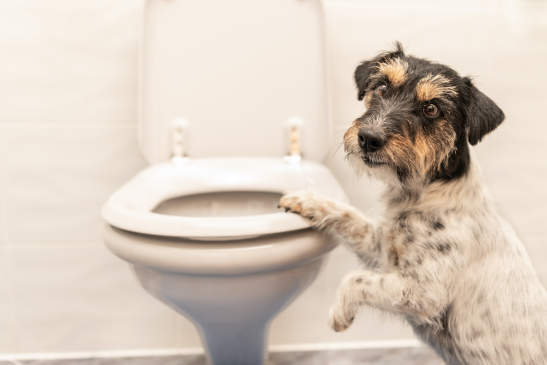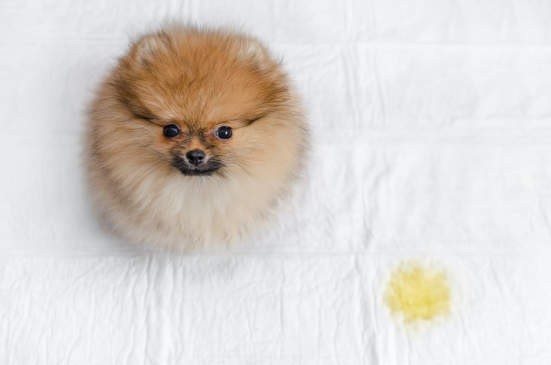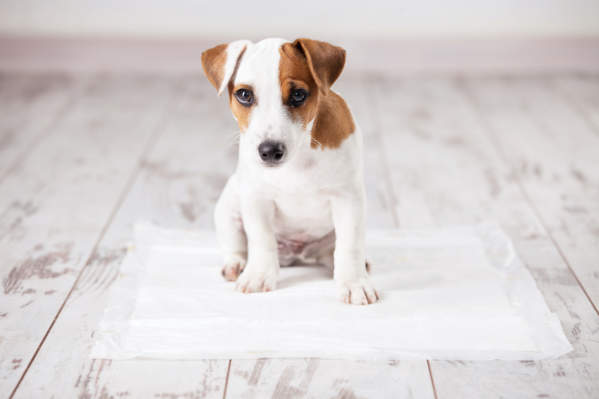New puppies are an exciting addition to any household, but as with any baby entering a home, there’s going to be a fair amount of adjustment and growing pains - not the least of which is getting that pretty little puppy potty trained.
Anyone who has ever potty trained a human baby knows this is quite the process and takes some work (and time!). So, don’t expect any instant results when starting to potty train your puppy.
Potty training a puppy takes time and work, but also patience and understanding. Remember that our pets are creatures of habit and it’s all about setting new habits. “Getting them outside on a routine basis is important. I often encourage owners to get their pets outside at least hourly!” says Dr. Andrea Johnston, co-owner of Gehrman Animal Hospital.
You may be saying right now, “But I’m already so busy!” — and maybe you are. But if you feel like you are too busy for your puppy, then you shouldn’t be having a puppy in the first place, right? Puppies require a lot of attention and TLC, especially when they are new. That doesn't mean help isn't available: There are so many wonderful resources that can come to your house to get your pet outside for a walk, so you are not missing work. You need to consider the extra expense if you won't be home during the day.
Keeping on top of your new puppy's comings and goings is important because you don’t want to give them too much freedom in the house to roam as that’s when they tend to find their favorite place to go to the bathroom. “It is also important to always provide positive reinforcement anytime they successfully potty outside!” says Dr. Johnston, as they will be more likely to continue doing the right thing if they know it prompts a positive reaction.
Then it’s all about incentives, positive reinforcement, and setting new habits and rituals. There are a few ways to do this:
Potty Training Method 1: Use A Bell
“Be sure to use it properly and your pup will be telling you when they need to go outside in no time!” says Johnna Devereaux, a clinical pet nutritionist. “Bells should be hung next to the door (never on the actual door as you will desensitize your puppy to its sound),” says Devereaux.
When first starting, ring the bell each time immediately before taking the puppy out to potty — and be consistent — you are teaching your puppy that that sound means it’s time to go out and do potty — if you forget to ring it — they will too.

Potty Training Method 2: Tie Yourself To Your Dog
To do this, you are going to need to start by tethering your puppy to you. "Go about your day and your puppy is always within a leash distance from you," says Aubrey Sanders, certified professional dog trainer, area services manager, and head of dog training at Wag Hotels.
This prevents the puppy from utilizing the restroom in a "hidden" place should they have an accident and, most importantly, it forces the owner to be more aware of their puppy's behavior throughout the day if they cannot escape their puppy. "This hyper awareness will allow the owner to take note (even if subconsciously) the different behavior changes the puppy elicits when they have to use the bathroom," says Sanders. In no time, the owner will be able to catch these behavioral changes and know when to take the puppy outside to do their thing.
And don't forget to REWARD REWARD REWARD every time the puppy uses the restroom outside. "I mean full-blown fireworks worth of praise and shower them in high value treats,” says Sanders. "This high reward system will cause the puppy to gradually become more and more obvious/dramatic in their tell signs of needing to use the restroom in an effort to get your attention to take them outside... and get that awesome reward," says Sanders. BOOM. Potty trained.
Potty Training Method 3: Use Potty Pads And A Crate
You’ll need some tools for this. “Have a sleeping crate set up inside a larger playpen. The crate should be small enough that that can only lie down in it for sleeping, but have no room to play or use the restroom in it. (Most dogs hate pooping where they sleep),” says Sanders.
The rest of the playpen area has a floor cover of potty pads. Literally no floor space should be showing. Every time the dog uses the potty pad, give them a low value treat (kibble) or praise. “Over time, reduce the size of the potty pad area to 90% coverage. The dog will have become so accustomed to using the potty pad, they will choose it over the 10% exposed flooring. over a few days, reduce to 80%... then 70%... and so on until you have only one potty pad on the floor that they reliably use!” says Sanders. If they make a mistake... oops! No big deal. Just increase the potty pad coverage again, and wait a little longer before reducing it back down.

Remember: Pace Yourself And Be Patient
Over the course of the week, gradually increase the time in between potty breaks. If your pup goes indoors, it just means you need to reduce the amount of time between potty breaks for a little longer before trying to move forward again (and at least it's on a potty pad for easy clean up if you are following the crate and playpen method simultaneously).
Never Punish A Dog For Making A Potty Error
Important note: No matter what method used, NEVER PUNISH A DOG for making a potty error. “Imagine how long it takes to potty train a human toddler!” says Sanders.
We shouldn't be expecting anything more from a puppy who doesn't understand the English language. “If we punish a dog for making a mistake, that could backfire, and just teach the puppy to not use the restroom in front of you (but everywhere else is fair game), leading to hidden brown treasures or pee spots under the couch that you don't discover until a week later. Mistakes happen. It’s a part of the learning process,” said Sanders.
Any mistakes made are really the human’s fault for not paying attention to the signs leading up to the accident! Just move on, and try to catch the next one in time.
If all of this seems like too much? Consider adopting a young adult dog from your local shelter that’s already potty trained! Or, sorry to say, maybe don’t get a dog until you can give them the time they deserve.
